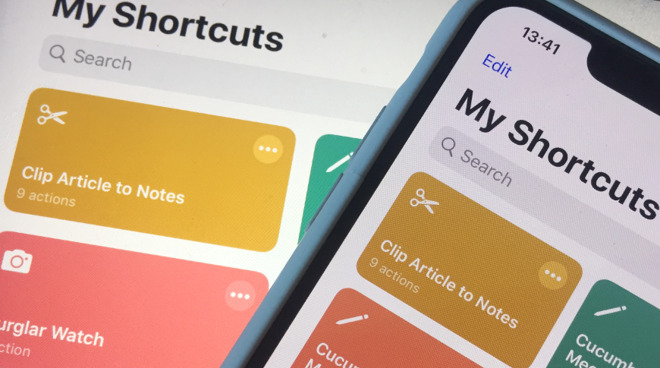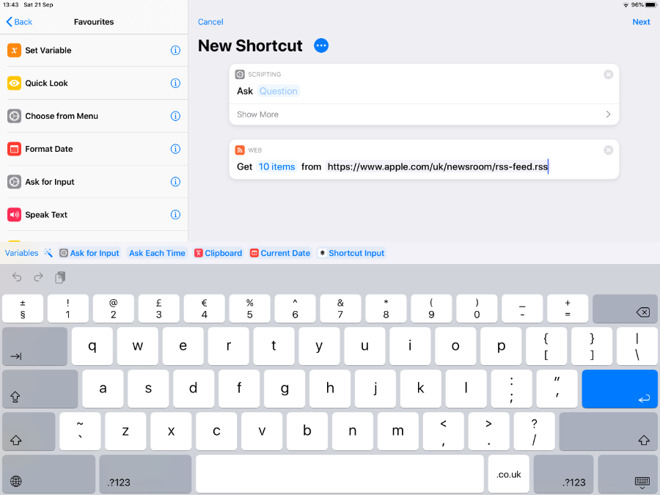Patent troll using 2018 patent to sue Apple over 2014 Shortcuts technology
Aftechmobile claims that with the design, implementation and use of the Shortcuts app, Apple infringes its patents regarding mobile application development software -- but it appears to be using a patent that was filed for and issued after Apple's first use of the technology.

Apple's Shortcuts app in iPadOS 13 (left) and iOS 13 (right)
Aftechmobile has filed a lawsuit against Apple in the US District Court Northern District of California regarding the Shortcuts app. The suit asserts that Apple infringes Aftechmobile's patents regarding mobile application development software and the use of what it calls "pre-coded software components."
Referring to its US Patent No 10,133,558, dated November 2018 and known as the '558 Patent, Aftechmobile says Apple is infringing "at least one of the 28 claims" in that patent, by making and selling the Shortcuts app.
The suit repeatedly compares the '558 patent with Apple's own descriptions of the Shortcuts app.
"Claim 5 [of the '558 Patent] includes, 'inserting one or more of said pre-coded software components into said launched mobile application creation interface; assembling said inserted one or more of said pre-coded software components..." says Aftechmobile's suit.
"Apple describes inserting one or more of said pre-coded software components into said launched mobile application creation interface," it continues, "as 'to add an action to your shortcut, touch and hold an action in the list, then drag it to the position you want in the shortcut editor.'"
What Apple calls Actions in its Shortcuts app, Aftechmobile refers to as "pre-coded software components." Then similar assertions compare what the patent refers to as the "mobile application creation interface" with Apple's description of how users can "create a new, custom shortcut using the Shortcuts app."
Aftechmobile is seeking a trial by jury and an unspecified sum for "a fair and reasonable royalty."

In Shortcuts, you drag actions from the list on the left, into the editor on the right. Aftechmobile calls these "pre-coded software components."
Apple has not publicly responded to the suit. The Shortcuts app is now shipping with iOS 13 and the forthcoming iPadOS 13, but was previously a separate, free product in the App Store. Prior to that, Apple's Shortcuts app was a third-party one called Workflow, which was first released in 2014.
Aftechmobile is a company based in Virginia. Its LinkedIn entry describes it as developing "innovative solutions to help our clients with Enterprise Mobile Strategy, Salesforce.com consulting... development of mobile Apps and more." The entry says the company has between 2 and 10 employees.
Currently Aftechmobile's official website either returns a 502 Bad Gateway error or, periodically, redirects to one called Mobrise.net which at time of writing went from being a registered, but non-existent site into one returning an error saying it is temporarily unavailable.
According to Crunchbase, Mobrise's founder and CEO is Arshad Farooqi. Aftechmobile's suit includes a copy of the '558 Patent which lists Farooqi as the applicant and inventor.
On the same day that Aftechmobile filed this patent infringement suit against Apple, it also filed a similar suit against Salesforce.com. Both cases are with the Northern District of California, and in both Aftechmobile is being represented by the same legal firm.

Apple's Shortcuts app in iPadOS 13 (left) and iOS 13 (right)
Aftechmobile has filed a lawsuit against Apple in the US District Court Northern District of California regarding the Shortcuts app. The suit asserts that Apple infringes Aftechmobile's patents regarding mobile application development software and the use of what it calls "pre-coded software components."
Referring to its US Patent No 10,133,558, dated November 2018 and known as the '558 Patent, Aftechmobile says Apple is infringing "at least one of the 28 claims" in that patent, by making and selling the Shortcuts app.
The suit repeatedly compares the '558 patent with Apple's own descriptions of the Shortcuts app.
"Claim 5 [of the '558 Patent] includes, 'inserting one or more of said pre-coded software components into said launched mobile application creation interface; assembling said inserted one or more of said pre-coded software components..." says Aftechmobile's suit.
"Apple describes inserting one or more of said pre-coded software components into said launched mobile application creation interface," it continues, "as 'to add an action to your shortcut, touch and hold an action in the list, then drag it to the position you want in the shortcut editor.'"
What Apple calls Actions in its Shortcuts app, Aftechmobile refers to as "pre-coded software components." Then similar assertions compare what the patent refers to as the "mobile application creation interface" with Apple's description of how users can "create a new, custom shortcut using the Shortcuts app."
Aftechmobile is seeking a trial by jury and an unspecified sum for "a fair and reasonable royalty."

In Shortcuts, you drag actions from the list on the left, into the editor on the right. Aftechmobile calls these "pre-coded software components."
Apple has not publicly responded to the suit. The Shortcuts app is now shipping with iOS 13 and the forthcoming iPadOS 13, but was previously a separate, free product in the App Store. Prior to that, Apple's Shortcuts app was a third-party one called Workflow, which was first released in 2014.
Aftechmobile is a company based in Virginia. Its LinkedIn entry describes it as developing "innovative solutions to help our clients with Enterprise Mobile Strategy, Salesforce.com consulting... development of mobile Apps and more." The entry says the company has between 2 and 10 employees.
Currently Aftechmobile's official website either returns a 502 Bad Gateway error or, periodically, redirects to one called Mobrise.net which at time of writing went from being a registered, but non-existent site into one returning an error saying it is temporarily unavailable.
According to Crunchbase, Mobrise's founder and CEO is Arshad Farooqi. Aftechmobile's suit includes a copy of the '558 Patent which lists Farooqi as the applicant and inventor.
On the same day that Aftechmobile filed this patent infringement suit against Apple, it also filed a similar suit against Salesforce.com. Both cases are with the Northern District of California, and in both Aftechmobile is being represented by the same legal firm.
Aftech Mobile Lawsuit by Mikey Campbell on Scribd

Comments
However, the 2016 patent application was a continuation application claiming priority back to a 2012 application. So it's the 2012 date that matters for the '558 patent.
That’s false. They would be an NPE (Non-Practicing Entity). “Patent troll” is not a legal term. I thought we addressed this distinction previously.
https://www.lexology.com/library/detail.aspx?g=2bc351e0-c393-4637-9c38-306ff7713557
They'll figure a way out to blame Apple.
but what about companies like IBM that spend considerable money on R&D, specifically to develop technologies to license to others? Correctly, a patent is a product, and those that develop them, according to the Constitution itself, have the right to use them as they choose.
so that’s where it gets complicated. If I develop a patent, and can’t sell or license it, and don’t have the wherewithal to produce it myself, I have the right to sell it to someone who thinks they can benefit from it. That’s perfectly legal, and proper.
but here’s the problem, and it happens to inventors who have sold their patents to others. If someone holding a patent sees someone violating it, they should be required to either contact that someone within a period of time that is fairly short, to express their grievance, and if they don’t receive satisfaction (whether they are correct, or not), to then take the matter to court. I see nothing wrong with that.
however, a real patent troll waits, sometimes for years, before bringing their case forwards, hoping that the success of the product has resulted in large amounts of sales, and a dependence upon that patent, and product, by those producing it. That way, they hope the producer of the product will believe they have to settle for a large payout. Generally, but not always, that means acquiring a fair sized library of patents, since the chance is low for any one patent being useful, or used by someone.
in this particular case, we don’t yet have any real facts. As the original patent dates from 2012, you would think that they have a case, but not necessarily. It’s possible that their, and Apple’s methods don’t really match closely enough. It’s also possible that the 2016 application moves them closer. But that may not matter as it’s too late. But then, Apple could have changed their own methods.
Compare and contrast the two patent stories from today, the companies involved, and how we've presented the information. See if you can find any differences between the two companies.
I’ve seen a number of definitions, and I’m not satisfied that any are correct in their entirety. Yes, companies that buy patents just to sit on the sidelines and wait for someone to violate them, is most likely easily described as a patent troll.
but I’ve sat in on meetings here in NYC of an inventors group. Most of them have interesting patents. Unfortunately, the way business works, it can be very hard, some say almost impossible to produce them on their own. It’s also very difficult to get companies to even talk to them. There is both the :not invented here” syndrome, and the much more serious problem of companies believing, not without cause, that merely talking to an inventor will set them up for a later lawsuit.
if someone sends Apple an idea, or even a patent, Apple simply puts that in a larger envelope, and sends it back unopened. It’s all about liability. Companies could be working on the same thing that some random inventor wants to license, or sell to them.
so the inventor might sell the patent to a patent licensing firm, which, by the way, is perfectly legal.
the difference is what that firm does next. If they have the proper industry contacts, they would try to license it properly. That would be a real business, and there are many firms who have been doing this for a very long time. But as I mentioned in my above post, they just sit on them, and wait for someone to use the tech who, most likely looked to find patents, but couldn’t (which happens more often than you would think), then that’s troll-like behavior.
If the terminology bothers any given reader, they don't have to read the story.
Why would I be angry about disagreement? "As we see fit" aren't fighting words. When I'm angry, it will be clear. Disagreement won't induce that.